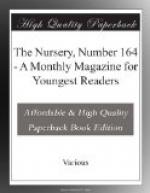Emma gave up the point, and began to play the exercise with a good grace. She did so well, that, when she had played it over thirty times, Miss Laura said to her, “That will do for to-day. We will take it up again in our next lesson. Now we will pass to a new piece.”
But Mrs. Dean said, “You have done enough to-day, my children. Now go and pick some strawberries for yourselves in the garden, and then we will take a walk in the grove.”
And this is what they did. Dora Burnside.
[Illustration]
[Illustration]
THE ANT’S DAIRY.
Do ants keep cows? Let us see. A little insect named an aphis is found on the leaf of most every plant. This little parasite lives on the sweet juice called honey-dew. Now the ants are very fond of this honey-dew, and know that they can obtain a supply from the body of the aphis.
The ants, therefore, climb up trees on whose leaves the aphides have collected. Then an ant goes close to one of these insects for a drop of the sweet juice. If this be not soon given out, the ant will gently tap the body of the aphis, and thus obtain a supply of the sweet fluid. After feasting on this, the ant will pass to another little aphis and treat it in the same manner for another drop.
But the ant has sense enough to treat the aphis as we treat our cows. Our farmers, you know, keep the cows in enclosed meadows, and supply them with hay and turnips when the grass fails. The ants also take a number of aphides close to their nests, and there keep them secure and supply them with suitable food.
Now the lady-birds are also fond of the aphides, and eat them up by hundreds. But the ant has sense enough to keep the aphis for a supply of honey-dew instead of killing it as the lady-bird does. Is not the ant, therefore, entitled to be regarded as a cow-keeper, and are not the tiny little aphides his milch-cows?
T.C.
* * * * *
BABY JEAN.
Eyes as bright as diamonds,
Mouth all sweet and clean,
Cheeks with tempting dimples
That’s my baby Jean!”
Hands as soft as rose-leaves,
Teeth like glistening pearls,
Little sunbeams woven
On her heads for curls.
Little feet that patter
Here and everywhere,
Little mind that’s busy,
Filled with childish care.
Lips from which the kisses
Bubble all day long,
Tongue that’s ever singing
Some sweet cradle-song.
How I love my baby
Words can never tell;
And she—she loves papa
Just as much and well.
She’s the dearest fairy
That was ever seen;
And from Heaven I’m certain
Came my baby Jean!
F.E. HAMILTON.
[Illustration: ]




